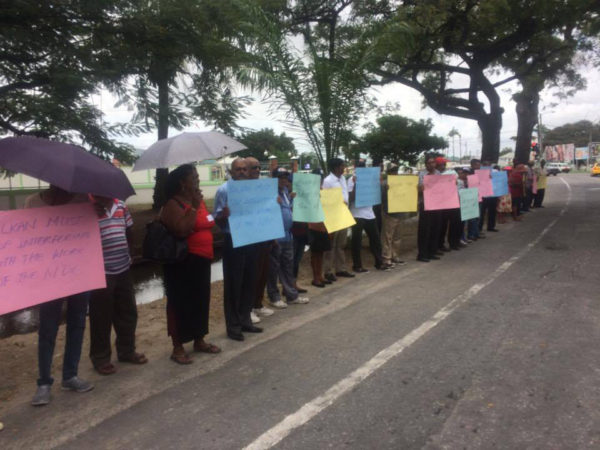The opposition PPP/C yesterday staged protests over the government’s delay in establishing the Local Government Commission, for which the administration is still to identify its nominees.
The PPP/C, which picketed outside both the Ministry of the Presidency and the Ministry of Communities, yesterday charged that the delay is facilitating an attempt by the government to control local government bodies by completing the appointments of new Town Clerks and overseers in new local authorities.
Minister of Communities Ronald Bulkan, in a September interview with the Stabroek News, had committed to getting the commission set up by the end of the month, having failed to deliver by previous deadlines. However, that the commitment was also not fulfilled.

Almost two dozen protestors formed a picket line on Vlissengen Road outside the Ministry of the Presidency yesterday. They carried placards, which read, among other things, “Who’s the bully? Bulkan,” “Appoint Local Government Commission now,” “APNU/AFC stop playing politics with our NDCs,” “Bulkan must stop interfering with the work of NDCs” and “Granger must instruct Bulkan to appoint Local Government Commission now.”
PPP Executive Secretary Zulfikar Mustapha told reporters the party decided to protest since a number of deadlines have passed and the commission has not been established. “We have named our three representatives. He [Minister Bulkan] has given a number of dates to appoint this Local Government Commission; to date we have not seen it appointed, although he had given us September 30,which has passed,” Mustapha said.
Mustapha charged that Bulkan is usurping the authority of the Local Government Commission. “That is why he is not appointing it. We believe government want to control these local government bodies,” he said.
Mustapha also pointed out that while in opposition, both APNU and the AFC fought for the commission to be operational and they should appoint it now that they make up the government of the day.
In 2014, President David Granger, while he was the Leader of the Opposition, had led demonstrations calling on the PPP/C government to have the commission functioning.
“Two wrongs don’t make a right,” Mustapha said of the situation now. “The (bill) was passed in Parliament and they have been fighting for it and now they should appoint it,” he added, while noting that there has been no logical explanation for the failure to set up the body.
In addition, Mustapha pointed out that a number of local authority bodies have submitted their budgets and “it took a very, very, long time for the budget to be approved by the Ministry of Communities.” He stated that such a situation could have been avoided if the commission were functioning.
The party executive said the PPP/C would continue to protest until the commission is operational.
“We are even more convinced than we were a month ago that this delay is facilitating the government completing the appointment of the new town clerks and overseers in the newly elected Local Authority Areas,” the party subsequently said in a statement to the press last evening.
The government, the statement said, “must answer why are the nominees of the President and that of the Minister of Communities being withheld. The public and the National Assembly deserve an answer.”
In July, the PPP/C had nominated former local government ministers Norman Whittaker and Clinton Collymore and former town clerk Carol Sooba as their representatives on the commission.
The Local Government Commission is provided for in Guyana’s Constitution. Article 78 (a) reads: “Parliament shall establish a Local Government Commis-sion, the composition and rules of which empower the commission to deal with as it deems fit, all matters related to the regulation and staffing of local government organs and with dispute resolution within and between local government organs.”
Clause 13. (1) of the enabling legislation says that the commission shall have power to deal with all matters relating to the regulation and staffing of local government organs, including employment and dismissal of staff and with dispute resolution within and between local government organs, and in particular, shall monitor and review the performance and implementation of policies of all local government organs, including policies of taxation and protection of the environment.
It also has the power to monitor, evaluate and make recommendations on policies, procedures and practices of all local government organs in order to promote effective local governance; investigate any matter under its purview and propose remedial action to the minister, whenever or wherever necessary; monitor and review all existing and proposed legislation, and or policies and measures relating to local government organs and to make recommendations for any legislation or any amendments to any legislation and or policy to the minister; and examine and propose ways of enhancing the capacity of local government organs.





